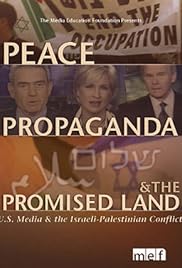
Peace, Propaganda & the Promised Land is a documentary film about the U.S. media and the Israeli-Palestinian
conflict. Here is some basic information about this film which premiered in
2005:
** Writers and
directors: Sut Jhally & Batsheba Ratzkoff
** Producer: Media Education Foundation (MEP)
** Run time: ca 80 minutes
** Producer: Media Education Foundation (MEP)
** Run time: ca 80 minutes
Several people
were interviewed for the film. Here are their names in alphabetical order:
** Seth Ackerman
** Stav Adivi
** Stav Adivi
** Arik Asherman
** Hanan Ashrawi
** Noam Chomsky
** Robert Fisk
** Robert Fisk
** Neve Gordon
** Toufic Haddad
** Sam Husseini
** Hussein Ibish
** Robert Jensen
** Robert Jensen
** Michael Lerner
** Karen Pfeifer
** Alisa Solomon
** Gila Svirsky
This film takes a clear stand on the topic at hand:
# 1. The
US news media tend to present Israel in a positive light, while the
Palestinians are usually presented in a bad light.
# 2. The version that is offered by the US media is
often incomplete or misleading and in some cases completely false, because it
ignores important historical facts and turns reality upside down.
How does it happen?
The language is very important:
** The US media will not talk about Israel’s “occupation”
of Palestinian land. They will not describe the occupation as “illegal.” But
there is an occupation, and it is a violation of international law.
** The US media will not talk about “a Jewish
settlement,” because this word may have negative associations. Instead they
will talk about “a Jewish neighborhood,” because this word has positive
connotations.
** When there is a violent clash between the two
sides, the US media will say that Israeli troops are trying to “defend
themselves against a Palestinian attack.” They will not say the opposite: that
the Palestinians are trying to “defend themselves against an Israeli attack.”
** When Israel makes a proposal to the Palestinian
side, the US media will describe it as “a generous peace offer.” When the
Palestinians turn down the offer, the US media will use this fact to say that
the Palestinians do not want peace. But if you study the details of the Israeli
proposal, you will find that the offer is not generous at all and that the
Palestinians have a good reason to turn down the offer.
One of the persons who are interviewed in the film
uses an image to explain the conflict between Israel and the Palestinians. Let
us say we have a house with a basement, ground floor and first floor. Family A
lives in this house. One day, family B decides to invade the house. They take
over the first floor completely; they take over half of the ground floor and
half of the basement. Then family B says to family A:
“You can have one room in the basement and one room on
the ground floor. We will take over the rest of the house. Please remember, we
control the staircase. When you want to go from the basement to the ground
floor, or the other way, you must pass a checkpoint. Show your passport and
your permit. We also control the bathroom. When you wish to use the bathroom,
you must pass a checkpoint. Show your passport and your permit. We think this is
a generous offer. Please sign this contract to confirm that you accept this
offer.”
Family A is the Palestinian population in the occupied
territories, while family B is the Israeli invasion of the occupied
territories: Jewish settlers supported by the Israeli army.
This is what the situation looks like when it is seen
from the Palestinian side. Do you think the actions of family B are right? Can
you understand that the members of family A are unhappy with the situation and
that they do not want to accept the contract that is offered by family B?
The Israeli-Palestinian conflict is highly
controversial. Many people have strong feelings about it, even if they have no
personal connections to this conflict.
Some people will like this film, because they agree
with what is being said, while other people will hate it, because they disagree
with what is being said. Whether you agree with the film or not, I think it is
worth watching, because it has some important information.
What do reviewers say about it? Here are the results
of three review aggregators:
** 57 per cent = Metacritic
** 64 per cent = Rotten Tomatoes
** 64 per cent = Rotten Tomatoes
** 83 per cent = IMDb
As you can see, the average ratings are quite good,
quite high. But if you ask me, they are not high enough. I want to go all the
way to the top with this product. I think it deserves a rating of five stars.
PS # 1. For more information, see the following items:
** Stone Cold Justice (2014)
** The Occupation of the American Mind (2016)
PS # 2. American Radical: The Trials of Norman Finkelstein is a documentary film about the (highly controversial) US scholar Norman Finkelstein, who has written extensively about Israel and the Palestinians. The film premiered in 2009.
** Stone Cold Justice (2014)
** The Occupation of the American Mind (2016)
PS # 2. American Radical: The Trials of Norman Finkelstein is a documentary film about the (highly controversial) US scholar Norman Finkelstein, who has written extensively about Israel and the Palestinians. The film premiered in 2009.
*****
![American Radical: Trials of Norman Finkelstein [DVD] [Region 1] [US Import] [NTSC]](https://images-na.ssl-images-amazon.com/images/I/41yasbXbz2L._SY445_.jpg)